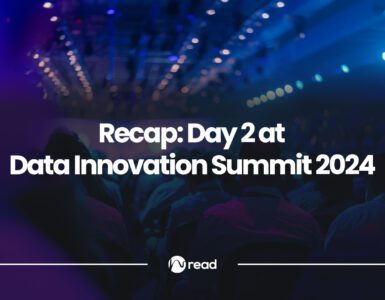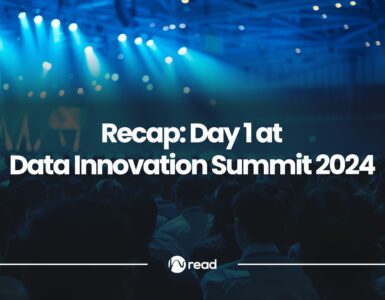The topic of data has become more and more relevant in recent years. No one needs to be convinced that data is 21st century’s oil or gold, and both private and public sector organizations are realizing that the variety of data stored in their information systems has great value – data can and must be used to enable data driven decision making. Data is an asset of every organization, so it is necessary to initiate changes to organize the ways of working with data. Naturally, such a change in approach to data management also poses several challenges.
Data Management Challenges
One of the main challenges is the lack of a centralized approach to data management. The most common practice recently was that each department, and sometimes even an employee, uses data locally to achieve its goals. For this reason, organizations often do not know who has what data and the same data is collected several times. The Bank of Lithuania (BoL) was not an exception. We identified that different departments often collect the same or very similar data for different purposes according to their mandate (financial stability, supervision, monetary policy, statistics, research).
Another common challenge is the lack of experience in implementing new data management practices. For data providers, the data submission process is often unclear, sometimes they even do not have the opportunity to receive advice on data submission on a one-stop-shop basis, and it is difficult to control the deadlines for data submission. In addition, at the moment a significant part of the data collected by organizations is presented in the form of reports, i.e. data providers fill in defined report fields according to certain rules and breakdowns. To prepare such reports, data providers often face additional costs and both human and technological investments are required.
Central banks are conservative in their nature but when it comes to data management, BoL has decided to take the lead and help push other organizations towards data management excellence as well.
The Bank of Lithuania saw the creation of Data Governance Policy and Data Management Strategy as a must to drive to the excellence in BoL data (BoLd) management, followed by tailored IT tools deployment to support the implementation of mentioned ambitions.
The mission of the governance policy and data management strategy at the BoL is to increase value created from data and to enable more timely data-based decisions. It is intended to ensure that data is treated and managed like an asset; it aims to create and implement a well-planned approach in handling the data created, stored, and processed at the organization. The strategy establishes common organizational methods, practices, and processes to manage, manipulate and share data in a repeatable manner. The data management strategy supports the BoL’s business strategy and is cross aligned with the bank’s IT and SupTech strategies. Our data strategy envisions achieving reliable and high-quality data, available for easy and safe access by users who understand the value of this data and know how to employ it in their Work.


The Main Principles of Bol’s Data Governance Policy and the Data Management Strategy
By implementing the Data Governance Policy and the Data Management Strategy, the BoL relies on 3 main principles – collect data only once, in real time and in a more granular manner. Lets elaborate on the importance of these principles, that are also a key part to become a data-centric organization.
Firstly, to avoid duplication of data collection and to reduce data collection costs and the burden on data providers, the same data from the same source should be collected only once. By implementing this principle, the BoL has centralized data collection by establishing Data and Reporting Division. Moreover, the BoL is also improving the data governance function so that all interested departments would know where and what data is already available or what data is planned to be collected. We follow the hub and spoke principle where all the data needs are managed through a centralized department.
Secondly, the BoL seeks that data would be collected in the greatest possible detail. The full implementation of this principle allows the decrease of collection of aggregated information (i.e. several different reports), and the necessary breakdowns could be calculated or the reports could be compiled by the bank itself. In this way, the burden on data providers is reduced so data providers could invest more in data quality assurance, and institutions have more complete and reliable information to make decisions.
Finally, the third principle – collecting the real time data – allows to make more efficient data-based decisions. This is perfectly illustrated by the data of the Loan Risk Database managed by the BoL. The data in this database are updated every second day and it was especially well use in 2020 after the start of the Covid-19 pandemic – the BoL was able to quickly assess the changed lending trends, the most vulnerable sectors, etc.
Thus, the changes resulting from these principles in the field of data management have already allowed the BoL to remove part of the supervisory and statistical reports, thereby reducing the administrative burden of data providers and to ensure that data is used both effectively and efficiently, avoiding data duplication and ensuring systematic management of data needs.
Moreover, faced by growing data fragmentation, duplicate collection and growing inhouse developed IT solutions complexity challenges, few years ago BoL has decided to embark upon organization wide data management transformation with the aim of making BoL a leader in this field through introduction of organizational improvements (partial centralization of data management functions, introduction of dedicated data management strategy), as well as implementation of cutting edge IT solutions to automate data collection, storage and management as well as dissemination processes.
Lessons Learned and Takeaways
There were many lessons learned in the process, but the key takeaway is that however complex it may seem, an all encompassing organizational transformation is far superior when compared to incremental improvements (especially when it comes to data management). To enable the main benefits of centralized enterprise data management, an unified IT architecture should be pursued so that „single source of truth“ and „single point of entry / data collection“ principles are implemented.
As a regulator, Bank of Lithuania is also in a unique position to influence technological decisions of other ecosystem participants through setting the tone for tools, technologies and processes used when implementing financial supervision and data collection functions. For example, we are planning to completely reengineer regulatory data collection by introducing the ability for market participants to provide their data directly through extensive use of APIs instead of excel files. Same goes for data dissemination where a self service style portal will enable different parties to access the data they need directly from Bank‘s data warehouse depending on their authorization and access level assigned to them.
We hope that by setting an ambitious course for ourselves we will also contribute to improving financial sector as a whole, especially in the context of rapid financial innovation happening around the world.
About the Authors
Ignas Aničas, Manager of Data Management at Bank of Lithuania and Edita Lukaševičiūtė, Head of Data Governance Division at Bank of Lithuania are speakers at the Data Innovation Summit 2023 where they will present on “Becoming a data-centric organization: the data management strategy at the Bank of Lithuania”.


Ignas Aničas is currently responsible for Data Management Maturity programme implementation at the Bank of Lithuania. 5+ years in Big4 Management Consulting (Intern to Senior Manager). Worked with clients ranging from small companies to global banks, governmental institutions and large state-owned enterprises delivering projects with varying scope and complexity locally as well as in countries such as Denmark, Kazakhstan, Georgia and Albania. Recently engaged in development of a regional digital innovation hub from the ground up while also delivering digitisation advisory services to manufacturing SMEs. Raised over 3m EUR investment for R&D infrastructure and advisory services development.


Edita Lukaševičiūtė is currently the Head of Data Governance Unit at the Bank of Lithuania. She is one of key persons behind the Bank’s Data Management Strategy. She is working on defining and setting the new data governance framework in the Bank of Lithuania. Edita has over 10 years’ experience in the banking sector, from which 5 years in central banking. Before being appointed as Head of the Data Governance Unit, Edita worked on the implementation of the new national Central Credit Register and on the project of analytical credit datasets (AnaCredit). Before that, she was heading the Loan Administration Unit in one of the small private banks in Lithuania.
The views and opinions expressed by the author do not necessarily state or reflect the views or positions of Hyperight.com or any entities they represent.















Add comment